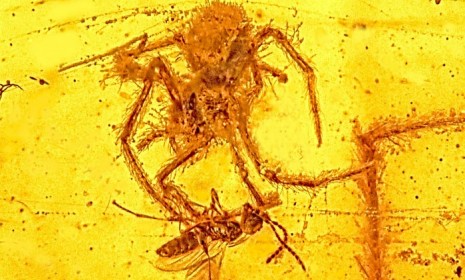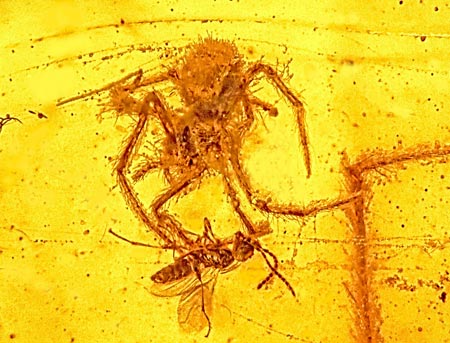The 100-million-year-old spider attack frozen in time
Researchers find an ancient piece of amber that shows a spider preying on a wasp caught in its web

A free daily email with the biggest news stories of the day – and the best features from TheWeek.com
You are now subscribed
Your newsletter sign-up was successful
The image: Researchers at Oregon State University have found a rare scene that dates back nearly 100 million years — and it's all fossilized in amber. Excavated in a Burmese mine, the ancient object shows a spider attacking a wasp that had gotten caught in its web. (See a large photo below.) "This juvenile spider was going to make a meal out of a tiny parasitic wasp, but never quite got to it," said George Poinar, Jr., a zoology professor at Oregon State University, as falling tree sap killed them both and preserved the dinosaur-era attack. "This was the wasp's worst nightmare, and it never ended." The amber also preserved 15 strands of spider silk.
The reaction: According to researchers, this is the first fossilized evidence of a spider attacking its prey. While this behavior exists today, says April Flowers at redOrbit, it's rare, meaning that this fossil is evidence of "some of the oldest examples of spider social behavior." But what's "hilariously poetic" about this discovery is that this species of wasp was known to parasitize spider eggs, says Casey Chan at Gizmodo. So it's possible that the spider was attempting to seek some "sweet revenge" on the wasp for preying on its eggs. Too bad both of them met their untimely end mid-action.

A free daily email with the biggest news stories of the day – and the best features from TheWeek.com
The Week
Escape your echo chamber. Get the facts behind the news, plus analysis from multiple perspectives.

Sign up for The Week's Free Newsletters
From our morning news briefing to a weekly Good News Newsletter, get the best of The Week delivered directly to your inbox.
From our morning news briefing to a weekly Good News Newsletter, get the best of The Week delivered directly to your inbox.
-
 Political cartoons for February 16
Political cartoons for February 16Cartoons Monday’s political cartoons include President's Day, a valentine from the Epstein files, and more
-
 Regent Hong Kong: a tranquil haven with a prime waterfront spot
Regent Hong Kong: a tranquil haven with a prime waterfront spotThe Week Recommends The trendy hotel recently underwent an extensive two-year revamp
-
 The problem with diagnosing profound autism
The problem with diagnosing profound autismThe Explainer Experts are reconsidering the idea of autism as a spectrum, which could impact diagnoses and policy making for the condition